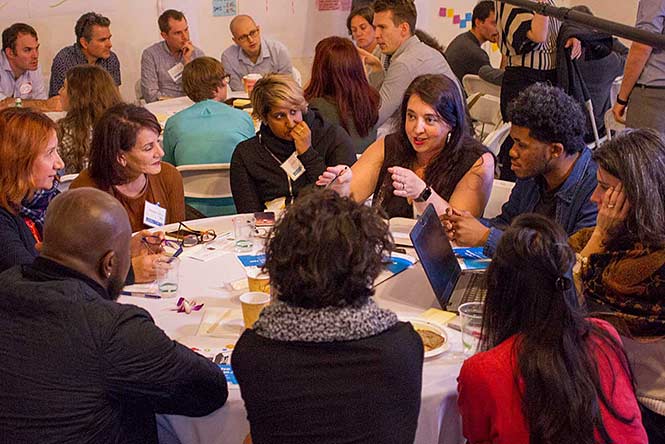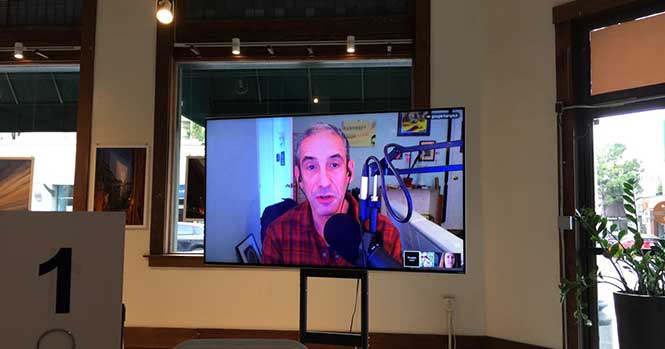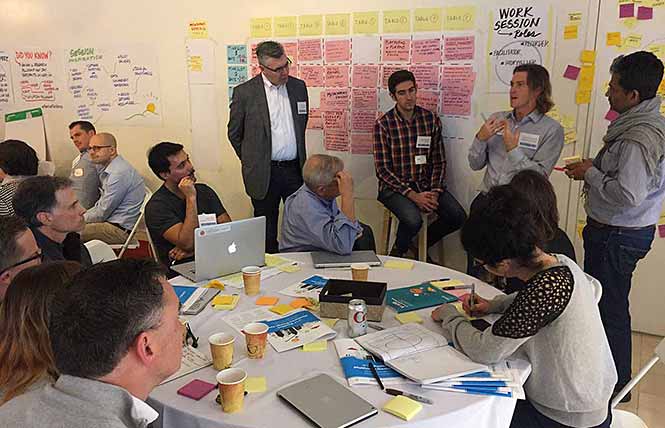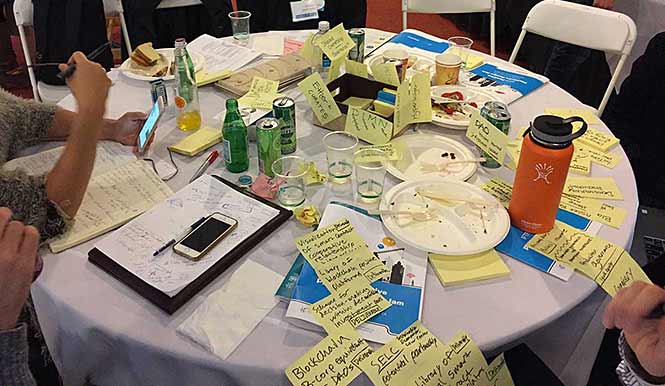Future Now
The IFTF Blog
Making the Gig Economy Work for Everyone
Ideas and prototypes at IFTF’s Positive Platform Design Jam

Creative technologists, social inventors, policy experts, and thought leaders came together for a two-day event at Institute for the Future in Palo Alto to tease out the thorny challenges of the evolving on-demand economy and prototype real solutions. (Image: Ben Hamamoto)
The platform economy can have something for everyone. People needing goods or services get what they want, people who have the time and skills to provide the goods and services get paid, and people who built and invested in the platforms that connect customers with providers get a cut of the action. Win-win-win, right?
Well, sometimes. But if you take a higher altitude look at the growing landscape of algorithmic matchmaking services, you’ll see some troubling aspects. For example, traditional workers can usually converse with human bosses, but on a platform, workers are told what to do by algorithmic “managers” that consider humans to simply be part of a pool of inputs to be allocated in response to changes in network conditions. To make things worse, workers in the gig economy are isolated from one another, making it extremely difficult for them to develop a collective voice to negotiate with platform owners and designers about issues that affect their livelihood.
Without taking action, this lopsided relationship between platform workers and platform owners could get worse, becoming like a high tech version of the day laborers in Upton Sinclair’s The Jungle, standing at the gates of the Chicago slaughterhouses in hopes of being selected for a shift of low-paid labor.
That’s why Institute for the Future (IFTF) had an open call for interested people to come to its offices in Palo Alto, California on November 30 and December 1, 2016 to participate in a two-day Positive Platforms Design Jam. The event was part of IFTF’s Workable Futures Initiative, established as a call-to-action for “policymakers, platform developers, and civic and labor leaders to blueprint positive platforms for people who work—platforms that not only maximize profits for their owners but also provide dignified and sustainable livelihoods for those who work on them. About 75 people attended, including technologists, historians, policy experts, software developers, and social inventors. Concurrent satellite design jams, set up by IFTF affiliates, took place in cities around the world.

“The ultimate platform is the platform that helps make people aware of the unseen game. “ Douglas Rushkoff beamed in from his office in New York to challenge workshop participants to reimagine the concept of a platform.
To get the ball rolling, IFTF Fellow and author Douglas Rushkoff presented the first of four “provocations” scheduled over the course of the design jam as a way to stimulate fresh ways of thinking about the platform economy. Doug cautioned against over-reliance of digital platforms as a cure for all employment problems, because, by their nature, platforms engender many of the alienating aspects of the digital age. “It’s a matter of us not getting carried away by the seeming novelty of our solutions… I‘m generally averse to digital platforms when the only thing they offer is scale. So, say we’ve got these giant international platforms?—?a cooperative Amazon, a cooperative Uber, a cooperative Twitter. Now, what about the real world and what do we actually want to get done?”
Andrey Fradkin, an economist who studies platform design and economics of digital platforms, delivered the second provocation. He focused on the “question of whether and when platforms should care about fairness and transparency,” through the pragmatic lens of profit maximization, something all platforms have to balance. If transparency and fairness have the result of maximizing profits on a particular platform, then that platform will promote them. If not, the platform will resist fairness and transparency. Fortunately, there are often good reasons for a platform to be fair and transparent. For example, Airbnb (where Andrey worked as a data scientist), makes public the criteria for becoming a Superhost on its platform. The benefits of keeping Superhost criteria a secret (such as preventing an Airbnb competitor from learning about the company’s inner workings) are outweighed by the benefits of encouraging people to be great (and therefore money-making) hosts on the platform.
Charged and challenged by Doug and Andrey’s provocations, the participants formed into self-selected groups and worked for the rest of the day to create a surprising number of creative platform prototypes, including:
- A gamified job recruitment platform that knows your skills and education, nudging you towards interactions that result in employment in one of the 5.8 million job vacancies that currently exist in the United States.
- A decentralized autonomous organization to pay media creatives. It would use blockchain technology to ensure that artists, writers, musicians, animators, producers, etc. get paid whenever their work is used.
- A supply side driven educational platform that creates workers for the long term. It would capture evidence of learning and award skill badges. A person’s unique badge mix would open personalized employment and educational pathways for them.
- The One Million People Fund—instead of focusing solely on finance, this fund would look at people as a resource, blurring the distinction between a contributor and a financial agent, allowing members of the platform to issue equity-like instruments based on their skills and experience.

Matthew Schutte (standing, second from right) of the Metacurrency project lead a workshop on open source tools for building positive platforms.
Provocation three was a panel with IFTF executive director Marina Gorbis, IFTF research director Devin Fidler, IFTF fellow Natalie Foster, and Workers Lab CEO Carmen Rojas. The panel explored how automation was changing the nature of work. Marina observed that every generation of technology creates new categories of need. For example, she said, “people didn’t expect their glasses to be sparklingly clean until we invented detergents and dishwashers.” This means that automation will undoubtedly present new opportunities for work, especially on platforms, but as she pointed out, it’s going to be a challenge to design platforms that pay workers well and treat them fairly. Devin agreed, warning that it is certainly possible to “design platforms that are extractive, like strip-mining.” The goal is to figure out how to prevent that from happening. “A lot of the 20th century involved people fighting about what industrial production could look like,” he said. “If we could knock a couple of decades off that process (this time around) we’d do ourselves a huge favor.” An important first step is to encourage platform owners to rethink their terms of service, which, as Natalie pointed out, are actually “work contracts.” One way to do this is by keeping in mind that, in an age where any information-based task will be automated, human beings will be the ones who will have to manage process bottlenecks and other areas that machines can’t handle. These “human capacities can’t be automated and will becomes central,” said Devin. “Untapped human capital becomes the natural resource.”
Cornell historian Louis Hyman delivered provocation four, titled “Unnatural Capitalism: How the New Deal Reinvented Capitalism and Why We Need to Do It Again.”
Today’s economic climate, he said, is like the Herbert Hoover era—lots of money sitting in banks because investment is too risky and there aren’t that many big things worth investing in. “Depressions happen when investment fails to connect with new leading sectors.” The FDR government made it easy for banks to invest in high-risk industries like aerospace (by insuring the investments and giving investors tax breaks), which jumpstarted the economy. We need to get that money out of banks and into new technology, or we risk entering a new depression, he said. Unfortunately, the federal government has cut science funding, and the situation is not likely to change in the new administration.
Hyman said that despite these stark facts, he’s optimistic. A participant asked him why. “What happens if I’m not optimistic?” replied Louis. “Well, it’s over. Then Marx was right. Profits go to zero, and all of this falls apart as the strongmen take everything away from you. Why am I doubling down on optimism? It’s my only chance for survival. It’s definitely your only chance for survival.”
The Design Jam made it clear that the platform economy is complex, exciting, risky, and inevitable. Many critical questions and potential paths were surfaced by experts, and this early stage of the platform economy, this is exactly the time when we need to be asking questions and testing concepts. The answers that we (and by “we” I mean every person on the planet) come up with and the choices we make will profoundly affect our lives for decades to come.
What’s next?
IFTF is offering a Positive Platforms Fellowship to jam participants who want to take their proposal to the next step. It’s a three-month program, and selected applicants will receive a stipend of up to US$9,000 to support their work and research in prototyping a “positive platform.”

Sticky notes: the platform design tool choice of experts everywhere.
Text and photos are licensed under a Creative Commons Attribution 4.0 International license.



